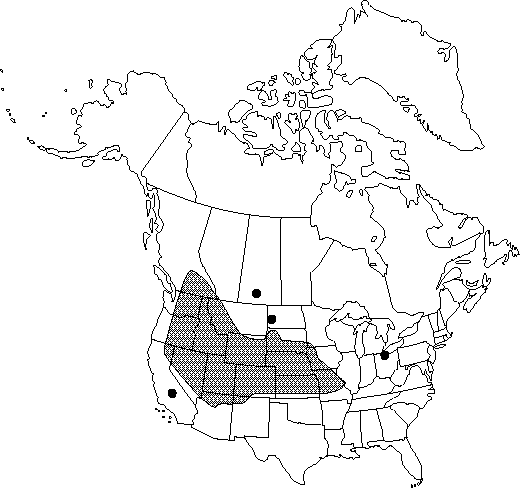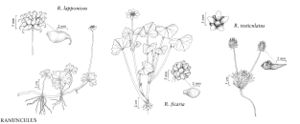Difference between revisions of "Ranunculus testiculatus"
Stirp. Austr. Fasc. 2: 97. 1763.
FNA>Volume Importer |
FNA>Volume Importer |
(No difference)
| |
Revision as of 22:15, 16 December 2019
Stems erect or ascending, not rooting nodally, villous, not bulbous-based. Tuberous roots absent. Basal leaf blades broadly spatulate in outline, 1-2×-dissected, 0.9-3.8 × 0.5-1.5 cm, segments linear, margins entire, apex obtuse to acuminate. Flowers: receptacle glabrous; sepals spreading, 3-6 × 1-2 mm, villous; petals yellow, 3-5 × 1-3 mm. Heads of achenes cylindric, 9-16(-27) × 8-10 mm; achenes 1.6-2 × 1.8-2 mm, tomentose; beak persistent, lanceolate, 3.5-4.5 mm.
Phenology: Flowering spring (Apr–May).
Habitat: Disturbed areas, especially in grassland
Elevation: 400-2500 m
Distribution

B.C., Sask., Ariz., Calif., Colo., Idaho, Iowa, Kans., Minn., Mo., Mont., Nebr., Nev., N.Mex., N.Dak., Ohio, Oreg., S.Dak., Utah, Wash., Wyo., native to Eurasia.
Discussion
In North America, Ranunculus testiculatus seems to be expanding its range rapidly in arid and semiarid areas. A second species of this subgenus, R. falcatus Linnaeus [Ceratocephala falcata (Linnaeus) Persoon], has been reported from North America, but all reports seem to be based on misidentified material of R. testiculatus.
Selected References
None.
